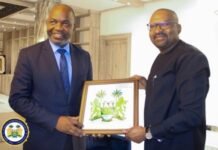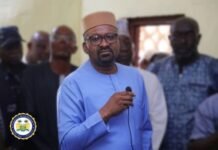By Foday Moriba Conteh
During the unveiling of the Budget Credibility and Revenue Expenditure Analysis Report on November 9th, 2023, at the Freetown City Council Lobby Hall in Freetown, the Budget Advocacy Network (BAN) sounded the alarm on the financial challenges facing the Sierra Leone Government. The Report disclosed that the combination of domestic revenue, grants and various financing mechanisms from January to September 2023 failed to cover the total operating expenses for the same period.
BAN highlighted a substantial deficit of NLe1, 350,160 in the Government’s financial balance for January to September 2023. The breakdown revealed that the total income, comprising domestic revenue, grants, and financing mechanisms, amounted to NLe11, 153,111, while the total operating expenses reached a higher NLe12, 503,271.
Speaking at the ceremony, Abu Bakarr Kamara, the Coordinator of the Budget Advocacy Network, stressed the need for immediate action to rationalize Government expenses and implement cost-reduction measures. He proposed measures such as conducting routine expenditure reviews to identify inefficiencies, implementing e-government for efficiency gains, and strategies to limit recurrent expenditures, including salaries and allowances.
He emphasized the importance of reducing overseas travels through transparent travel policies, conducting cost-benefit analyses before approving trips, and centralizing travel management to ensure budget adherence.
The report underscored Sierra Leone’s ambitious goal in its Medium-Term Revenue Strategy, aiming for domestic revenue of 20% of GDP by 2027. It closely monitors monthly revenue collection and high-level expenditure, providing citizens with updates on Government’s efforts despite economic challenges in 2022, including the lingering COVID-19 pandemic and repercussions from the Ukraine-Russia war.
Analyzing data from the 2022 Fiscal Year and January to September 2023, the Report highlighted a positive trend in revenue collection, with FY2023 domestic revenue surpassing FY2022 by 18%. Contributions from various revenue streams, including Taxes on Income, Profits & Capital Gains and Non-Tax Revenue demonstrated significant performance.
However, the expenditure analysis revealed that general Public Services, Economic Affairs, and Education Services were the top sectors in terms of spending, totaling operating expenses of Le 12,503,269 for January to September 2023.
He urged the Government to adopt the Report’s recommendations, including expenditure rationalization, e-government implementation, and strategies to limit recurrent expenditures. Abu Bakarr Kamara emphasized the importance of improving property tax collection, adopting a digital tax system, and building trust in Government through effective use of tax funds to enhance revenue.
The Report also raised concerns about over-executed budgets, which could lead to domestic borrowing, crowding out private sector borrowing, and macroeconomic instability. Kamara stressed the need for Governments to adhere to their budgetary commitments, enhance accountability and allow citizens and oversight bodies to track spending.
Concluding with a sectoral analysis of disbursements to key Ministries, the Report highlighted the importance of sustained efforts toward sound public financial management practices to address Sierra Leone’s budget credibility challenges. It emphasized that a committed Government could significantly enhance budget credibility, supporting efficient fund allocation to priority areas and improving overall service delivery.





